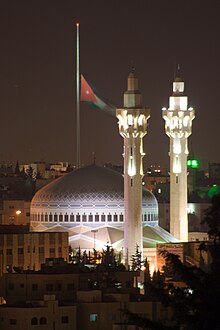Religion in Jordan (2021)
Islam (97.1%) Christianity (2.1%) Other (0.8%)
| Part of a series on | |||||
| Geography | |||||
|---|---|---|---|---|---|
| History | |||||
|
|||||
| Economy | |||||
| Demographics / Culture | |||||
| Health / Education | |||||
| Government / Politics | |||||
| Armed Forces | |||||
| Transportation | |||||
| Communications | |||||
Sunni Islam is the dominant religion in Jordan. Muslims make up about 97.2% of the country's population. A few of them are Shiites. Many Shia in Jordan are refugees from Syria, Lebanon, and Iraq.
The country also boasts one of the oldest Christian communities in the world, coexisting with the rest of the population. They made up about 4.2% of the population when the country had 5 million inhabitants in 2005. down from 20% in the 1930s, due to several reasons, mainly due to high rates of Muslim immigration into the country. More than half are Greek Orthodox. The rest are Latin or Greek Rite Catholics, Syrian Orthodox, Protestants and Armenians., ibid. Jordanian Christians in a country of almost 10 million are thought to number 250,000-400,000 including those of Palestinian origin but excluding tens of thousands of Syrian and Iraqi Christians in the country.
Demographics
In 2022 Muslims made up about 97.2% of the country's population; there were almost 750,000 refugees and other displaced persons registered in the country, mainly Sunni Muslims from Syria.
In the same year, Christians made up 2.1% of the country's population. A 2015 study estimated 6,500 Christian believers, from a Muslim background, were in the country (mainly Protestant).
In 2020, there were approximately 14,000 Druze in the country, and 1,000 people following the Baháʼí Faith; there were reported to be no Jewish citizens.
In 2022, it was noted that the country has a small number of Buddhists, Hindus, Zoroastrians and Yazidis.
Distribution
The percentages vary slightly in different cities and regions, for instance the south of Jordan and cities like Zarqa have the highest percentage of Muslims, while Amman, Irbid, Madaba, Salt, and Karak have larger Christian communities than the national average, and the towns of Fuheis, Al Husn and Ajloun have either majority Christian or much greater than national average. Several villages have mixed Christian/Muslim populations, like Kufranja and Raimoun in the north.
Anglicans/Episcopalians in Jordan are under the oversight of the Anglican Bishop in Jerusalem. The Church of the Redeemer is the largest congregation by membership of any church in the entire Episcopal Diocese of Jerusalem. Other Episcopal churches are in Ashrafiyya, Salt, Zarqa, Marka refugee camp, Irbid, Al Husn and Aqaba.
Social life
In general, Muslims and Christians live together with no major problems regarding differences and discrimination. However, the smallest minorities, consisting of small Shia, Druze and Baháʼí Faith contingents, experience some degree of religious discrimination from the government.
Religious freedom
Main article: Freedom of religion in JordanThe state religion is Islam, but the constitution provides for the freedom to practise one's religion in accordance with the customs that are observed in the Kingdom, unless they violate public order or morality.
Some issues, however, such as religious conversion, are controversial. Although conversion to Islam is relatively free of legal complications, those wishing to leave Islam are not recognised as such and are still considered legally Muslims and face immense societal pressure. Among the restrictions against religious minorities are:
- Jordan's government may deny recognition to a religion.
- Baháʼís are not permitted to establish schools, places of worship or cemeteries.
- Aside from Christians, all other non-Muslim minorities do not have their own courts to adjudicate personal status and family matters.
- Muslim women may not marry non-Muslim men, such as Christians, unless the men legally convert to Islam.
- Since Muslims are prohibited from converting to other religions according to the Sharia law, converts from Islam cannot change their religion on governmental records. However, converts to Islam are required to change their religious identification to "Muslim" on governmental records and civil documents.
In June 2006, the government published the International Covenant on Civil and Political Rights in the government's Official Gazette. Article 18 of that Covenant provides freedom of religion.
In 2023, the country was scored 2 out of 4 for religious freedom.
Baháʼís and other unrecognised religious minorities face several restrictions.
See also
- Demographics of Jordan
- Jordanian Interfaith Coexistence Research Center
- Islam in Jordan
- Christianity in Jordan
- History of the Jews in Jordan
- Irreligion in Jordan
References
- ^ "2021 Report on International Religious Freedom: Jordan". state.gov. Retrieved 2023-07-14.
- "Chapter 1: Religious Affiliation". The World's Muslims: Unity and Diversity. Pew Research Center. 9 August 2012. Retrieved 26 October 2015.
- Nicky, Adam (27 November 2012). "Shiites in Jordan maintained low profile while marking Ashura observance". The Jewish Journal. The Media Line. Archived from the original on 28 November 2012. Retrieved 16 March 2016.
- Who are the Christians in the Middle East, Betty Jane & J. Martin Bailey, pp. 168–169
- Kildani, Hanna (8 July 2015). "الأب د. حنا كلداني: نسبة الأردنيين المسيحيين المقيمين 3.68%" (in Arabic). Abouna.org. Retrieved 17 July 2016.
- ^ US State Dept 2022 report
- Johnstone, Patrick; Miller, Duane (2015). "Believers in Christ from a Muslim Background: A Global Census". IJRR. 11: 14. Retrieved 20 November 2015.
- The ARDA website, retrieved 2023-08-28
- "The Berkley Center for Religion, Peace, and World Affairs at Georgetown University: Religious Freedom in Jordan". Archived from the original on 2015-07-10. Retrieved 2014-11-10.
- "US State Dept 2019 report on Jordan". United States Department of State. Retrieved 2020-11-05.
- Freedom House website, retrieved 2023-08-08
- البهائيون في الأردن
- "2018 Report on International Religious Freedom: Jordan". Archived from the original on 2019-06-23.
| Demographics of Jordan | |
|---|---|
| Religions | |
| Ethnic groups | |
| Foreign nationals | |